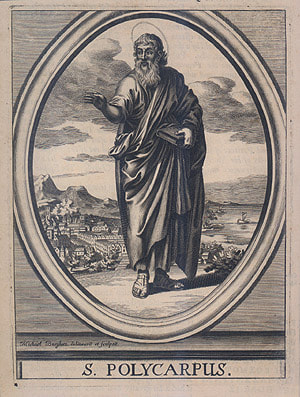|
My blog posts revolve around my interests and vocation as a historian: the intersection of history and contemporary church life, the intersection of history and contemporary politics, serendipitous discoveries in archives or on research trips, publications and research projects, upcoming conferences, and speaking engagements.
I sometimes blog for two other organizations, the Canadian Baptist Historical Society and the Centre for Post-Christendom Studies. The views expressed in these blogs represent the views of the authors, and not necessarily those of any organizations with which they are associated. |
|
https://commons.wikimedia.org/wiki/File:Burghers_michael_saintpolycarp.jpg As I continue my summer reading in the writings of the early church I have been struck by a few choice quotes in writings related to Polycarp, the famous bishop of Smyrna. Polycarp was one of the most important early apostolic fathers. He was a virtual “rock star” in the early church because he had been discipled by John, one of the twelve disciples. His memories provided a vital firsthand link to the life of Jesus. If anyone wanted to get some clarity on matters related to the events of Jesus’ life one only had to talk to the well-informed Polycarp. In sum, his conduct was impeccable, his witness was vital, his word was authoritative, and his martyrdom (156 AD) confirmed his credentials.
The three quotes related to Polycarp that caught my attention deal with education, fallen Christians, and martyrdom. There is wisdom to be found in the ancient commentary.
The first quote comes from Ignatius’ letter to Polycarp. The letter was written to address a number of pastoral and theological issues, one of which being how best to train and educate Christians in the faith. But let me charge you to press on even more strenuously in your course, in all the grace with which you are clothed, and to call all your people to salvation. You must do justice to your position, by showing the greater diligence both in its temporal and spiritual duties. Spend your time in constant prayer, and beg for ever larger gifts of wisdom. Be watchful and unsleeping in spirit. Address yourself to people personally, as is the way of God himself, and carry the infirmities of them all on your own shoulders, as a good champion of Christ ought to. The heavier the labour, the richer the reward. There is no credit in spending all of your affection on the cream of your pupils. Try rather to bring the more troublesome ones to order, by using gentleness. Nobody can heal every wound with the same ointment; where there are acute spasms of pain, we have to apply soothing poultices. So in all circumstances be wise as a serpent, though always harmless as the dove.
The second quote comes from the pen of Polycarp himself. In his letter to the Philippians he provides an array of pastoral advice, some of which relates to how to deal with a former leader called Valens and his wife. Polycarp’s warning against “excessive fondness for money” suggests that their problem related to finances. Polycarp's advice was to treat them with kindness so as to win them back to the faith. I feel the deepest sorrow for that man and his wife; may the Lord grant them real repentance. You too, for your part, must not be over severe with them, for people of that kind are not to be looked on as enemies; you have to restore them, like parts of your own person that are ailing and going wrong, so that the whole body can be maintained in health. Do this, and you will be promoting your own spiritual welfare at the same time.
The third quote comes from the famous document The Martyrdom of Polycarp, one of church’s earliest and most important martyrdom accounts. Martyrdom was a realty for Christian in the empire. In fact, it became idealized and even sought after by some. Yet the account of Polycarp’s martyrdom includes a reminder that persecution may come, and martyrdom may arrive with the next nocturnal knock on the door, but one must not seek it out. Experience had shown that the story did not end well for those who sought it out. There was one man, however, Quintus by name, a Phrygian recently arrived from Phrygia, whose courage failed him at the sight of the beasts. It was he who had compelled himself and some others to surrender themselves voluntarily; and after much persuasion he was induced by the Governor to take the oath and offer of incense. And that is the reason, brothers and sisters, why we do not approve of people offering themselves spontaneously. We are not taught anything of that kind in the Gospel. The above quotes taken from Early Christian Writings (Penguin, 1987)
0 Comments
Leave a Reply. |
Archives
May 2024
|

 RSS Feed
RSS Feed
